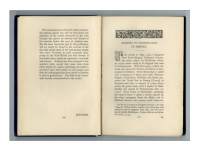Students will read excerpts from Christopher Sauer’s letter to his family and friends describing his journey to America in 1724. Sauer left Germany with his wife and young son for a better life in Pennsylvania. In the letter, he describes the journey across the ocean and his arrival in Philadelphia. Students should immediately be able to detect a difference in tone and content between Sauer’s letter and Mittelberger’s account. Even though the two documents are describing the same journey and mapping the same path, Sauer and Mittelberger were distinctly different in their attitude and how they described the people and the experience. Students will encounter the same problems historians deal with when analyzing different points of view and will be asked to assess Mittelberger’s and Sauer’s credibility.
Praise for a New Life in a New World
Praise for a New Life in a New World
Essential Questions
Objectives
Students will be able to:
- Distinguish different points of view of historical events and understand biases and motivations of the people creating historical records by comparing the accounts of Christopher Sauer and Gottlieb Mittelberger.
- Interpret primary source materials and tables by assessing the credibility of the primary accounts of German immigration.
Primary Sources
Other Materials
- Kelsey, R. W. “An Early Description of Pennsylvania: Letter of Christopher Sauer, written in 1724, describing conditions in Philadelphia and vicinity, and the sea voyage from Europe.” The Pennsylvania Magazine of History and Biography 45 (1921): 243-254.
- An Early Description of Pennsylvania, Letter of Christopher Sower
- Student Worksheet
Suggested Instructional Procedures
- Assign reading, Christopher Sauer’s Letter and Mittelberger’s Journey to Pennsylvania (under Primary Sources) with Worksheet 2 (Chart Activity).
- Review answers to Chart from Worksheet 2 (Chart Activity).
- Lead class discussion of Critical Thinking Questions on Worksheet 2 (Chart Activity).
- Ask students whose account they would find more credible if they were living in Germany in 1754, debating whether they should immigrate to Philadelphia.
*In regards to Question 4 of the Critical Thinking Questions, Gottlieb Mittelberger did describe the richness of Pennsylvania’s farmland and the fair system of government. However, he was harshly critical of the lack of religiosity caused by religious plurality, the fact that German immigrants were immediately forced to renounce allegiance to their native country when they arrived in North America, and the “Britishness” of the colonists.
Vocabulary
Artisan: A skilled laborer or craftsman
Custom-house: Government building or office where customs (taxes) were collected and ships were cleared for entering or leaving a country
Dysentery: An inflammation of the intestines. Symptoms included extreme diarrhea, high fever, and severe pain and was usually caused by poor sanitation
Florin: A gold coin and form of currency
Forty-Eighters: Germans who immigrated to the United States after the failure of the Revolutions of 1848. They tended to be educated, middle class, and anti-slavery
French and Indian War: A conflict between France and Great Britain in their North American colonies. The war began in 1754 but later spread to Europe where it was known as the Seven Years War (1756-1763)
Indenturing: A process of contracting labor for a set number of years in exchange for passage across the ocean
Lutheran: The largest Protestant denomination in Germany. They followed teachings of Martin Luther and stressed education and justification through faith alone
Mennonites: A religious sect who followed the teachings of Menno Simon (1492-1559). They believed in simplicity of food and life, separation of church and state, and refused to bear arms or serve in the military. They were closely related to the Amish
Newlander: An agent commissioned by shipping companies to convince people to settle in America.
Principality: A sovereign state ruled by a prince or princess
Redemptioner: A person who agreed to serve usually three to seven years in the colonies in exchange for transportation. At the end of the term, the person was released from his or her obligations and awarded all the rights of a free citizen. Redemptioner was sometimes called indentured servant
Scurvy: A disease caused by vitamin C deficiency. The symptoms included spongy and bleeding gums and general weakness and was usually caused by lack of fresh fruit and vegetables
Thirty Years’ War (1618-1648): A war mostly fought in Germany between Protestants and Catholics but involved many European nations including the Holy Roman Empire, France, and Sweden. The war was started by German Protestant princes who resisted the authority of the Holy Roman Empire and ended with the Peace of Westphalia
Traffickers: People who dealt in buying and selling humans and/or their labor
Related Resources for Students

Plans in this Unit
Grade Level
Duration
Standards/Eligible Content
About the Author
This unit was created by Hannah Kim. Updated for SAS by Clara McGrath and Danielle J. Gross, Education Interns, Historical Society of Pennsylvania.
Attention Teachers!
Let us know how you used this plan and be featured on our site! Submit your story here.


